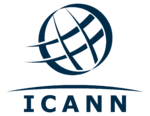ICANN 01
 | |
| Dates: | March 2-4, 1999 |
| Location: | Singapore |
| Venue: | Singapore International Convention Centre Pan Pacific Hotel |
| Website: | ICANN 1 site |
| Historical Significance | |
| First ICANN Meeting Supporting Organizations established | |
ICANN 1 was held in Singapore, between March 2nd and 4th, 1999. As ICANN's debut public Meeting, held just 5 months after the formation of the non-profit, ICANN 1 consequently involved laying the groundwork for the structure and functioning of future ICANN Meetings. Individual meetings were held in several venues around the city, including the Singapore International Convention and Exhibition Centre and the Pan Pacific Hotel.[1]
Currently, Singapore is one of only three cities to host more than one ICANN conference; Marina Del Rey, California, which is ICANN's headquarters, and Los Angeles, California, have both hosted two conferences as well. The second ICANN conference to be held in Singapore was ICANN 41, held between the 19th and 24th of June, 2011.[2] During the opening ceremony of ICANN 41, Peter Dengate Thrush, then Chairman of the Board, reminded the audience of how much the Internet community and ICANN has come since its humble beginnings as a largely American cultural phenomenon originally overseen by the United States Federal Government.[3]
Meeting[edit | edit source]
ICANN held two days of public forums followed by a day of closed door discussion on a proposal regarding the formation of Supporting Organizations within ICANN. The use of closed door meetings by the new organization grew extremely sharp criticism from some participants. Ellen Rony started a campaign using gray ribbon images on websites opposing ICANN's closed door tactics, and Network Solutions also issued a statement condemning the move.[4]
Sessions included:
- GAC Organizational Meeting, held on March 2
- DNS Root Server System Advisory Committee Organizational Meeting, held on March 2
- Advisory Committee on Membership Meeting, held on March 2
- Open Meeting, held on March 3, in conjunction with the APRICOT '99 plenary session.[5]
Select topics discussed include:
- DNSO proposals
- Shared Registry System testbed and guidelines
- Discussion of ICANN policies and procedures
- Consideration of reports from Advisory Committees[6]
- Finances, staffing, and logistics[7]
A complete agenda can be seen here.
Developments[edit | edit source]
- The structure and duties of the DNSO were determined, designating it as an advisory group within ICANN, responsible for policies concerning the DNS, as well as for selecting three of ICANN's 19 directors.[8]
- It had previously been decided that supporting organizations with expertise in domain names would be needed, and that ICANN should create an internal group rather than rely on existing technical and professional organizations to report to its board. Thus, seven constituencies of Internet stakeholders were self-organized through the adoption of the Statement of Domain Name Supporting Organization Formation Concepts resolution. Later that year, the DNSO would be officially recognized as the larger umbrella group for these Supporting Organizations.[9]
- The Board adopted a policy for the accreditation of competing registrars for the .com, .org, and .net TLDs.
- The Board adopted a conflict of interest policy and a reconsideration policy, as required by the ICANN bylaws.[10]
Historical Notes[edit | edit source]
- The Board of Directors at the time were Esther Dyson (Interim Chairman), Geraldine Capdeboscq, George Conrades, Greg Crew, Frank Fitzsimmons, Hans Kraaijenbrink, Jun Murai, Michael Roberts, Eugenio Triana, and Linda S. Wilson.
- Staff included Michael Roberts as Interim President and CEO, Molly Shaffer Van Houweling as Interim Secretary, and Andrew McLaughlin as Interim Treasurer and Chief Financial Officer.[11]
- At the time, the GAC was chaired by future ICANN CEO Paul Twomey.[12]
- At the time of the first ICANN meeting, the DNS had a completely different makeup:
- There were 171 million total Internet users, compared to 2 billion in 2011.
- 56% of those Internet users were from the United States or Canada, and 15% from the Asia Pacific Region. Today, fewer than 14% of Internet users come from North America, and 44% are from Asia.[13]
References[edit | edit source]
- ↑ ICANN.org
- ↑ Meetings.ICANN.org
- ↑ ICANN 41 Opening Transcript
- ↑ Google Books: NetworkWorld March, 8 1999
- ↑ ICANN.org
- ↑ ICANN.org
- ↑ ICANN 41 Opening Transcript
- ↑ ICANN Dispatch from Singapore - 4 March 99
- ↑ NTIA.doc.gov
- ↑ ICANN Dispatch from Singapore - 4 March 99
- ↑ Wayback Machine: ICANN.org About
- ↑ ICANN 41 Opening Transcript
- ↑ ICANN 41 Opening Transcript
